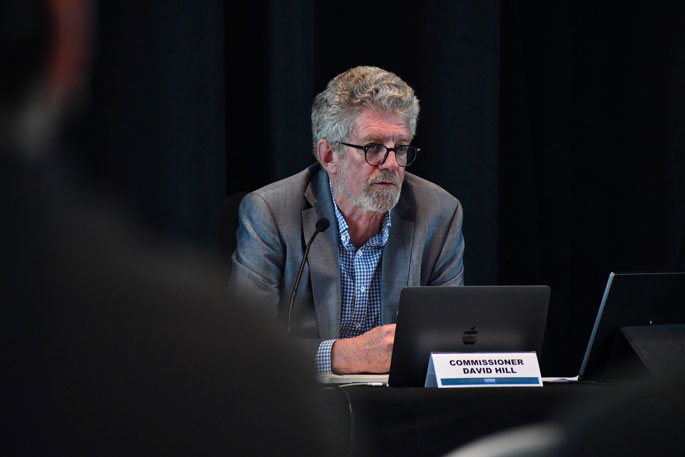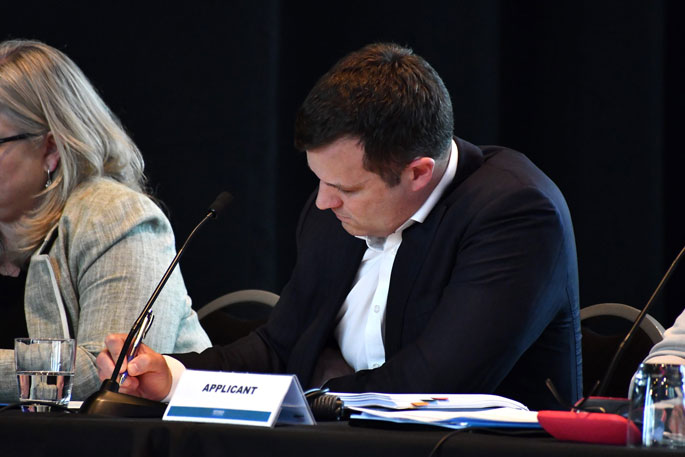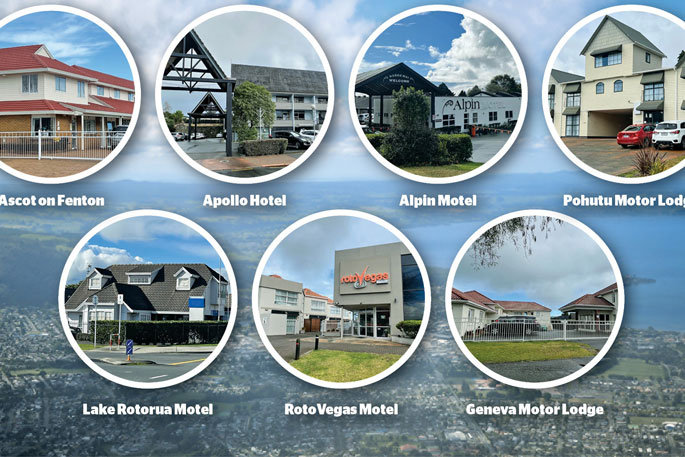Issues relating to emergency housing motels will get “significantly worse” if contracts are not extended a year, a government agency lawyer says.
A three-day hearing began on Tuesday for submissions on whether the Government should be able to extend emergency housing motels.
Independent commissioner David Hill will consider the Ministry of Housing and Urban Development’s applications to keep seven emergency housing motels operating in Rotorua for up to another year after 13 motel resource consents granted in 2022 expire in December.
All but one of the 37 submitters oppose the applications.
 Independent commissioner David Hill at the hearing on Tuesday. Photo / Laura Smith
Independent commissioner David Hill at the hearing on Tuesday. Photo / Laura Smith
The motels were not used for tourism and people with children or disabilities, young people, kuia, kaumātua, and the elderly had priority.
Rotorua Lakes Council staff recommended approving the extension with strict conditions.
At the hearing, consultant planner Craig Batchelar said community concerns remained the same as they were in 2022. These included crime, antisocial behaviour and reputational damage as a tourism destination.
Cultural concerns were also highlighted, particularly by those living near the Māori village of Whakarewarewa, with three motels nearby. These were not taking new residents and were expected to be closed by June next year
The council’s recommended conditions included more motel monitoring and reporting on occupancy and incidents, continued stakeholder engagement via a Community Liaison Group and adherence to an exit strategy.
More detail on the strategy, such as specific timing, was desired.
The conditions also addressed concerns relating to a lack of outdoor motel space particularly for children by recommending child age-group restrictions at certain sites.
Tuesday’s hearing focused on the applicant’s evidence.
 Ministry of Housing and Urban Development legal counsel Nick Whittington at the hearing in Rotorua. Photo / Laura Smith
Ministry of Housing and Urban Development legal counsel Nick Whittington at the hearing in Rotorua. Photo / Laura Smith
Ministry legal counsel Nick Whittington said the organisation empathised with the community over its concerns about the social consequences of the motels being used for emergency accommodation.
However, these problems would get “significantly worse” without the emergency motels and the support they provided.
Support services and onsite management are available 24/7.
“The impression I get from reading some of the submissions is if you don’t grant the consents, the issue is going to go away and that’s not the case at all.”
He and other ministry representatives were confident about strategy to progressively end motel use in a year and said setting firm dates would be counterproductive.
The ministry’s partnerships and performance general manager, William Barris, said it would need to “urgently exit” the remaining motels if the consents were not granted. This could lead to couch-surfing, people living in garages, on the streets or in vehicles.
Social outcomes specialist and planner Joanne Healy provided a Social Impact Assessment for the applicant’s evidence which acknowledged issues the community experienced.
However, “anti-social behaviour and crime in the community at large is not directly attributable to [contracted emergency housing]” but were part of a wider and more complex set of social factors.
She said contracted motels had positive impacts on those they served.
Several ministry submitters said the organisation was transparent with its data. Whittington described how it worked with the council and other agencies to reduce the number of households in emergency housing from 700 in March 2022 to 190 in August this year.
Non-contracted emergency housing numbers reduced from 17 motels in December 2022 to four now. He said it made sense to target those providers because they did not provide the same support as contracted motels.
The ministry needed the year to wind down the use of motels appropriately, he said. It was also confident it could end motel use because it had 350 social houses in the pipeline by next December combined with other housing alternatives.
The ministry understood about 234 would be available for whānau in emergency housing.
The ministry did not support the age restrictions the council recommended because it could mean some families may be unable to access emergency housing.
It was open to discussion on improving the Community Liaison Group - which included community representatives - or running it differently.
The commissioner heard that motels were kept tidy and that there was a high level of service.
Hill said the panel noted in 2022 it might need to extend the consents. He also said ministers could change their minds on previous announcements as well as the “daily cutbacks in all sorts of areas of government expenditure”.
There is one more applicant submission on Wednesday followed by the council’s evidence and lobby group Restore Rotorua.
Other submitters will be heard on Thursday as well as the council’s response and applicant’s right of reply.
LDR is local body journalism co-funded by RNZ and NZ On Air.




0 comments
Leave a Comment
You must be logged in to make a comment.